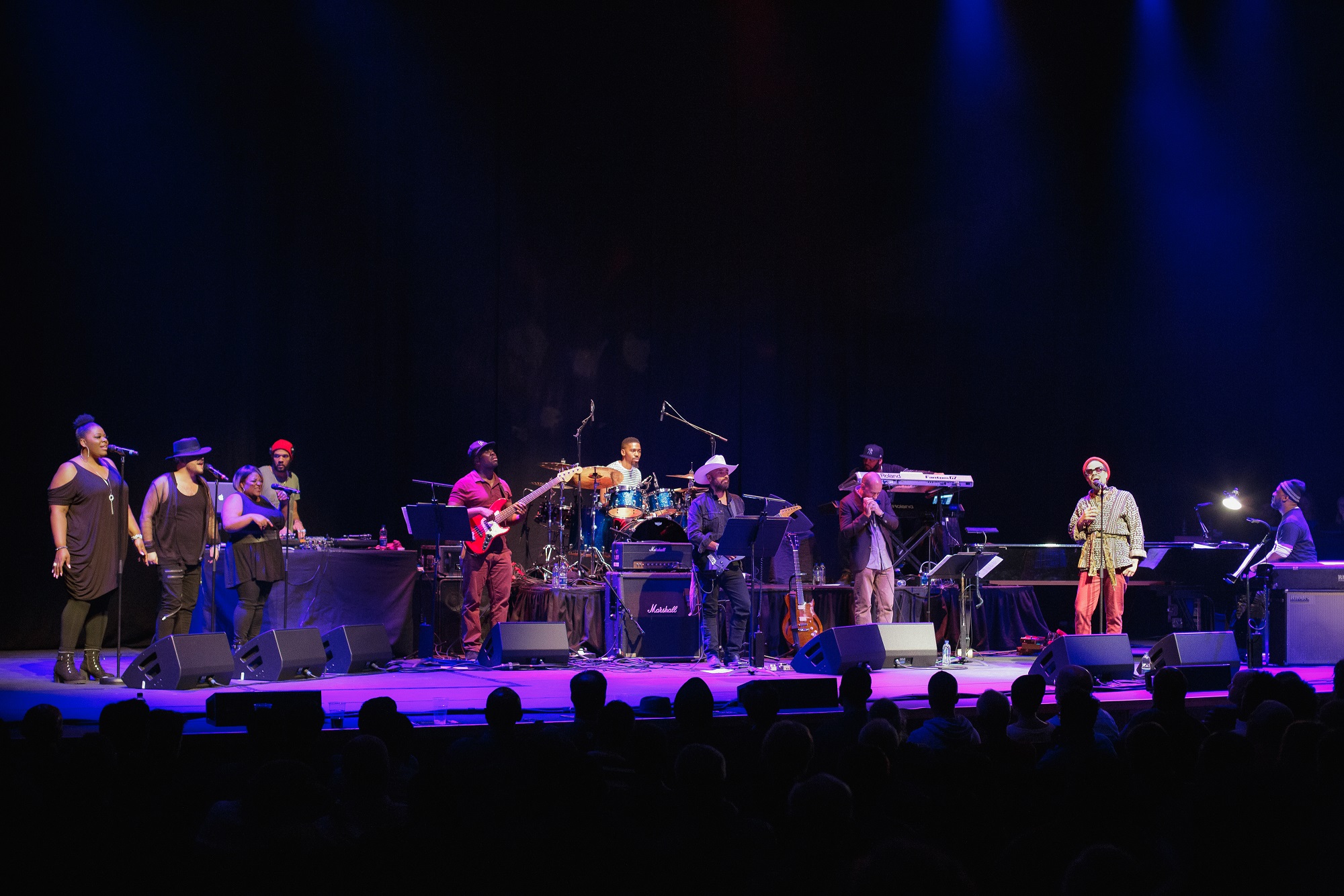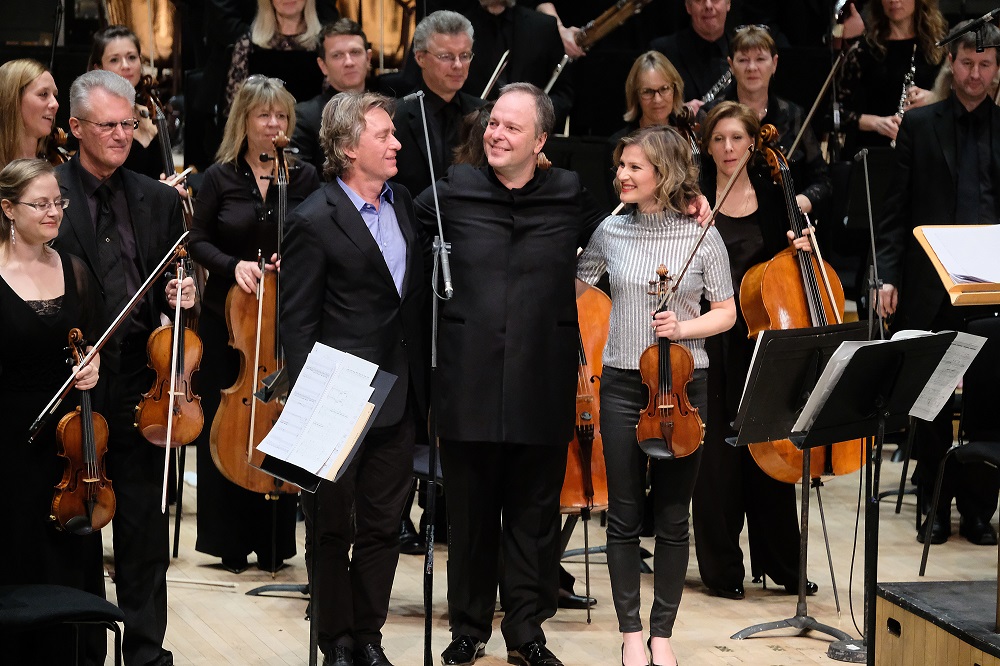As moments of transcendence go, Laura Mvula’s guest spot at Robert Glasper’s EFG London Jazz Festival show provided one of the year’s most transporting musical moments.
Powered by the huge harmonic slabs carved out by keyboardist Travis Sayles and the vast backbeat of bassist Derrick Hodge and drummer George “Spanky” McCurdy, Mvula’s delicately outerspacious “Bread” was recast as a 10-minute meditation. The mantra-like repetitions of the refrain "Lay the breadcrumb down so we can find our way", together with the uniquely affecting timbre of Mvula’s voice, succeeded in uniting and lifting up 2,000 souls in a warm, hymn-like embrace. It was a moment of emotional fellowship that no one who witnessed it is likely to forget.
Glasper’s generosity towards his band mates was evidenced right from the off
With so many different elements coming into play throughout the generously proportioned set – acoustic, electric, guest vocalists, a DJ supplying ghostly electronic washes and speech samples, plus a paean to the music of Stevie Wonder right at its centre – this felt more like a classic revue than a standard gig.
Glasper’s generosity towards his band mates was evidenced right from the off, with Glasper in the company of his Covered trio band mates, bassist Vicente Archer and drummer Damion Reid.
The trio first explored the circular, minimalist funk of Prince’s "Sign o' the Times", beginning with a pulsating, scene-setting drum solo from Reid. When the track proper kicked in, Archer dug deep into the familiar, gnomic bass riff, while Reid’s left hand performed small miracles of dexterity on hi-hat and ride cymbal. In the final musical clearing, Glasper’s brief duet with a sample of vocalist Erykah Badu (Mongo Santamaria's classic “Afro Blue” from Glasper’s 2012 album, Black Radio) was a nice turntablist touch.
The loops and layerings of Radiohead’s “Packt Like Sardines in a Crushd Tin Box” saw the trio further exploring the creative interconnections between hip hop and jazz, Glasper’s towering solo on Fender Rhodes hinting at the euphoric quality that’s never far from the surface of his music. A quick stage reset, and we were back with Vula Malinga, LaDonna Harley Peters (two-thirds of LaSharVu) and Brendan Reilly, raising their voices in a euphonious take on Wonder’s “Overjoyed”. Vula then took centre stage for a powerhouse interpretation of “Superwoman”, bathed in a cavernous reverb and with the vocal line panning left and right across the Barbican, McCurdy supplying the monstrous backbeat.
A quick stage reset, and we were back with Vula Malinga, LaDonna Harley Peters (two-thirds of LaSharVu) and Brendan Reilly, raising their voices in a euphonious take on Wonder’s “Overjoyed”. Vula then took centre stage for a powerhouse interpretation of “Superwoman”, bathed in a cavernous reverb and with the vocal line panning left and right across the Barbican, McCurdy supplying the monstrous backbeat.
Bilal then let his liquid phrasing loose on “Too High”, with a captivating solo from harmonica player Grégoire Maret and funky comping from guitarist Mike Severson, before detonating the incredible power of his falsetto on his self-penned “Levels”, which concluded with an impressively vast, pulsing wall of sound. (Pictured above: Robert Glasper and guests including Bilal. Photo by Emile Holba for the EFG London Jazz Festival.)
Prefaced by a breathtaking solo from Hodge, the first of Mvula’s two contributions was a relatively straight reading of “Visions”. Here, Glasper’s tintinnabulating work in the upper register of the grand piano in the outro suggested that the music was attempting to break away from the terrestrial sphere. But this was merely a taste of the engulfing beauty that was to follow.
@MrPeterQuinn
Overleaf: watch Robert Glasper play “Packt Like Sardines in a Crushd Tin Box”

 Well might any contemporary composer quake about sharing a programme with Sibelius, whose originality in the best performances always makes his music sound as if were composed yesterday. And these interpretations were indeed the best. Oramo knew he could draw maximum, dynamically nuanced soulfulness from the BBCSO strings in the profoundly beautiful hymns which frame the work – the last, dying out on a single note, is as convincing an ending as Sibelius ever wrote, making this more than ever a candidate for the end rather than the beginning of the programme (as usual, alas, it appeared in the first half). So did the muscular energy of the outer movement's strange adventures and the Beethoven-like primal charge of the scherzo, bursting straight out of the Allegretto moderato's twilight zone. The sudden flautato semiquavers which quicken its pulse with quiet intensity, backing quirky snatches of birdsong, are a test for any conductor; all credit to Oramo and the BBCSO that those forest murmurs have never sounded more compelling.
Well might any contemporary composer quake about sharing a programme with Sibelius, whose originality in the best performances always makes his music sound as if were composed yesterday. And these interpretations were indeed the best. Oramo knew he could draw maximum, dynamically nuanced soulfulness from the BBCSO strings in the profoundly beautiful hymns which frame the work – the last, dying out on a single note, is as convincing an ending as Sibelius ever wrote, making this more than ever a candidate for the end rather than the beginning of the programme (as usual, alas, it appeared in the first half). So did the muscular energy of the outer movement's strange adventures and the Beethoven-like primal charge of the scherzo, bursting straight out of the Allegretto moderato's twilight zone. The sudden flautato semiquavers which quicken its pulse with quiet intensity, backing quirky snatches of birdsong, are a test for any conductor; all credit to Oramo and the BBCSO that those forest murmurs have never sounded more compelling. A quick stage reset, and we were back with Vula Malinga, LaDonna Harley Peters (two-thirds of LaSharVu) and Brendan Reilly, raising their voices in a euphonious take on Wonder’s “Overjoyed”. Vula then took centre stage for a powerhouse interpretation of “Superwoman”, bathed in a cavernous reverb and with the vocal line panning left and right across the Barbican, McCurdy supplying the monstrous backbeat.
A quick stage reset, and we were back with Vula Malinga, LaDonna Harley Peters (two-thirds of LaSharVu) and Brendan Reilly, raising their voices in a euphonious take on Wonder’s “Overjoyed”. Vula then took centre stage for a powerhouse interpretation of “Superwoman”, bathed in a cavernous reverb and with the vocal line panning left and right across the Barbican, McCurdy supplying the monstrous backbeat.